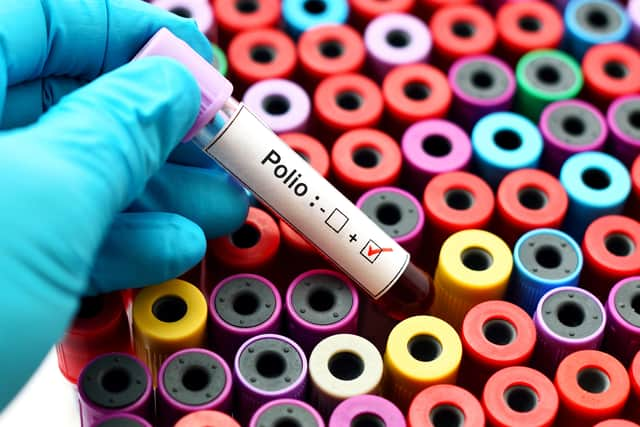Polio outbreak: national incident declared after virus detected in UK sewage samples
and live on Freeview channel 276
People are being urged to make sure their polio vaccines are up to date after an outbreak of the virus was detected in UK sewage samples.
Public health officials have declared a national incident after the UK Health Security Agency (UKHSA), working with the Medicines and Healthcare products Regulatory Agency (MHRA), found polio in sewage samples collected from the London Beckton Sewage Treatment Works.
Advertisement
Hide AdAdvertisement
Hide AdThis serves around four million people in north and east London.


Polio can cause paralysis in rare cases and can be life-threatening, but it was officially eradicated in the UK in 2003.
Although it is normal for the virus to be picked up as isolated cases and not detected again, experts have been concerned after several genetically-linked viruses were found in samples between February and May of this year.
The virus has previously been detected when a person who was vaccinated overseas with the live oral polio vaccine (OPV) returned or travelled to the UK and shed traces of the vaccine-like poliovirus in their faeces.
Advertisement
Hide AdAdvertisement
Hide AdBut the virus in the recent samples has evolved in England and is now classified as a ‘vaccine-derived’ poliovirus type 2 (VDPV2).
VDPV is a strain of the weakened poliovirus that was initially included in the oral polio vaccine.
The virus has only been detected in sewage samples and no cases of paralysis have been reported.
What experts are saying
Dr Vanessa Saliba, consultant epidemiologist at UKHSA, said: “Vaccine-derived poliovirus is rare and the risk to the public overall is extremely low.
Advertisement
Hide AdAdvertisement
Hide Ad“Vaccine-derived poliovirus has the potential to spread, particularly in communities where vaccine uptake is lower.
“On rare occasions it can cause paralysis in people who are not fully vaccinated so if you or your child are not up to date with your polio vaccinations it’s important you contact your GP to catch up or, if unsure, check your red book.
“Most of the UK population will be protected from vaccination in childhood, but in some communities with low vaccine coverage, individuals may remain at risk.
“We are urgently investigating to better understand the extent of this transmission and the NHS has been asked to swiftly report any suspected cases to the UKHSA, though no cases have been reported or confirmed so far.”
Why have new polio cases been detected in the UK?
Advertisement
Hide AdAdvertisement
Hide AdThe UKHSA is working on the theory that a person vaccinated abroad with the polio vaccine entered the UK early in 2022 and was shedding the virus.
That person may now have passed it onto other, closely linked individuals in north-east London, who in turn are shedding the virus into their faeces.
Experts are looking into the possibility that just one family or extended family may be affected, but it is unclear as to how many people need to be infected for polio to be detected in sewage samples.
Is there a polio vaccine in the UK?
The polio vaccine is given on the NHS when a child is eight, 12 and 16 weeks old as part of the 6-in-1 vaccine.
Advertisement
Hide AdAdvertisement
Hide AdIt is given again at three years and four months old as part of the 4-in-1 (DTaP/IPV) pre-school booster, and then at 14 as part of the 3-in-1 (Td/IPV) teenage booster.
All of these vaccines need to have been given for a person to be fully vaccinated, but babies who have had two or three doses will have substantial protection.
Comment Guidelines
National World encourages reader discussion on our stories. User feedback, insights and back-and-forth exchanges add a rich layer of context to reporting. Please review our Community Guidelines before commenting.
